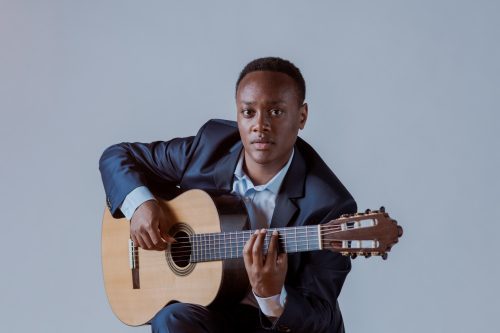
 United Kingdom Edinburgh Worldwide Competition 2024 [5]: Raphaël Feuillâtre (guitar, 9.8), Stephan Dohr (horn, 10.8), Carolin Widmann (violin, 10.8), Dénes Várjon (piano, 10.8). Queen’s Corridor, Edinburgh, 9 & 10.8.2024. (SRT)
United Kingdom Edinburgh Worldwide Competition 2024 [5]: Raphaël Feuillâtre (guitar, 9.8), Stephan Dohr (horn, 10.8), Carolin Widmann (violin, 10.8), Dénes Várjon (piano, 10.8). Queen’s Corridor, Edinburgh, 9 & 10.8.2024. (SRT)

First the excellent news. The Edinburgh Worldwide Competition’s chamber music programme is as various as ever this 12 months. Positive, there are just a few string quartets and tune recitals, however a lot of the three weeks is taken up with a extremely various teams of solo musicians, plus thrilling one-offs like Jakub Józef Orliński’s immersive baroque theatre piece (evaluation click on right here) or, on the ultimate morning, an exploration of Rossini’s Petite Messe solenell.
The grumps? Whether or not for causes of sustainability or accessibility, the pageant has completed away with programme booklets for many of their performances, and all the Queen’s Corridor sequence to this point. As an alternative, we get freesheets which give a helpful rundown of what’s being carried out, however no data no matter in regards to the music. That’s high-quality when the musician talks about it from the stage, because the Schola Cantorum de Venezuela did very powerfully, as a result of it provides the viewers an perception into the programming course of, in addition to a reference to the performers. There was none of that in Raphaël Feuillâtre’s live performance, although. As an alternative, we obtained a beautiful assortment of guitar music about which Feuillâtre mentioned not one phrase, and we have been left to guess about his thought course of in placing the entire thing collectively.
Moreover, they’ve taken to drawing the curtains on the corridor and blacking out the skin gentle, which is okay when it’s a theatre piece like Orliński’s, however very odd for the others. And whose choice is that, the pageant’s or the artist’s? I can’t think about Feuillâtre having requested for it. In spite of everything, his programme merely oozed Mediterranean daylight, notably in its second half with a lot Spanish music that immediately transported me to the gothic quarters of sun-drenched Spanish cities with their musty atmospheres and heavy warmth. Why shut out what little sunshine we get in Scotland on one of many few days it might assist for instance the music?
For all that its foundation remained mysterious, Feuillâtre’s programme was very effectively constructed as pure sequences of sound. Every half started with one thing light to ease the listener into its soundworld, earlier than changing into livelier and, on the finish, more difficult. The second, Spanish, half for instance, started with acquainted tunes from Llobet and Albéniz earlier than shifting into chewier fare from Tarrega and Dyens’s exhilaratingly acrobatic Clown Down. The primary half moved in an analogous trajectory from Bach to the lightning figurations of Llobet’s Variations. Spectacular as that was, although, it was the baroque transcriptions that I discovered notably fascinating, magically so in locations. The music of the eighteenth century – Bach, Couperin, Scarlatti – fitted the guitar so effectively that, when you didn’t know higher, you’d have sworn they have been written for them. They fitted the instrument completely fantastically in these transcriptions and Feuillâtre performed them with such a beautiful sense of legato and an understatedly light dynamic that, by the point the interval started, I discovered myself in one thing approaching a state of zen.
There wasn’t a lot zen in Stephan Dohr’s programme, however, however he did talk about his programme, and his live performance was all the higher for it. Sure, there was a gorgeously honeyed Brahms Trio, and his enjoying of Beethoven’s youthful Horn Sonata was a remarkably invigorating factor to listen to at 11am on a Saturday morning. Likewise, Carolin Widmann and Dénes Várjon performed Beethoven’s C minor violin sonata with drama and looking depth.
By far essentially the most fascinating factor on the programme, nonetheless, was Ligeti’s Horn Trio, which Dohr took the time to unpack from the stage earlier than they performed it. His demystifying of the piece made it essentially the most involving factor within the live performance in consequence, the three musicians treating it as a research in loneliness and isolation, notably in its creepy finale that explored the darkest extremities of the devices. And so they had the curtains open, which by some means helped.
Simon Thompson
The Edinburgh Worldwide Competition runs at venues throughout the town till Sunday twenty fifth August. Click on right here for additional particulars.
9.8.2024 – Raphaël Feuillâtre (guitar), Queen’s Corridor.
Bach (tr. Raphaël Feuillâtre) – Prelude 1 in C main, BWV 846 from The Effectively-Tempered Clavier, E-book 1
Couperin (arr. Antoine Fougeray) – Les barricades mystérieuses
Duphly (arr. Antoine Fougeray) – Médée
Bach (arr. Gérard Abiton) – Choral: Ich rufe zu Dir, Herr Jesu Christ, BWV 639
Bach after Vivaldi (arr. Judicaël Perroy) – Concerto in D main, BWV 972
Scarlatti (arr. Gérard Abiton) – Sonate, K208
Scarlatti – Sonate, K322
Llobet Soles – Variations on a theme of Sor (La Folia); El noi de la mare; Canco del lladre
Albéniz – Granada; Asturias
Tárrega = Preludes 5 & 6
Barrios Mangoré – La Catedral
Piazzolla (arr. Tirao) – Adiós Nonino
Dyens – Triaela III ‘Clown Down’ (Gismonti au Cirque)
10.8.2024 – Stephan Dohr (horn), Carolin Widmann (violin), Dénes Várjon (piano), Queen’s Corridor.
Beethoven – Horn Sonata
Ligeti – Trio for Violin, Horn and Piano
Beethoven – Violin Sonata No.7 in C minor
Brahms – Trio for Horn, Violin and Piano


